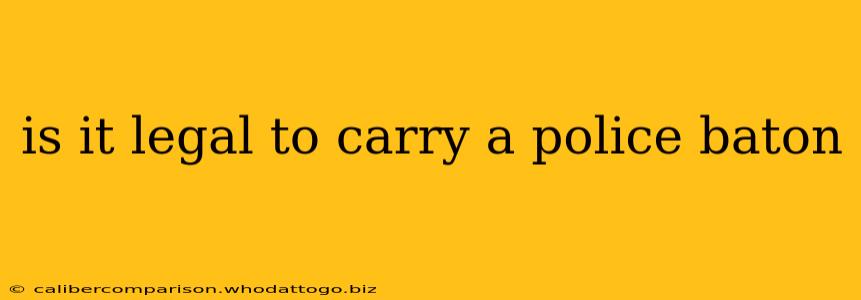The legality of carrying a police baton, also known as a nightstick, billy club, or asp, varies significantly depending on your location and the specific circumstances. There's no single, universal answer. This guide will break down the key factors influencing the legality of baton possession and provide a framework for understanding the relevant laws.
Factors Determining Legality
Several factors determine whether carrying a police baton is legal:
-
Your Location: Laws concerning self-defense weapons differ drastically between states, provinces, and even municipalities. Some jurisdictions may outright ban the possession of batons, while others might permit them under specific conditions (e.g., for law enforcement, security personnel, or with a permit). State and local ordinances should always be consulted.
-
Your Reason for Carrying: Even in jurisdictions where batons aren't explicitly banned, the reason for carrying one is crucial. Self-defense is a common claim, but it's not always a legally sufficient justification. Prosecutors may scrutinize the circumstances surrounding the carrying of a baton, considering factors like perceived threat levels and the proportionality of using a baton for self-defense.
-
Type of Baton: The design and features of the baton can also play a role. Some jurisdictions may make distinctions between expandable batons, fixed-length batons, and those made of specific materials. Certain types may be subject to stricter regulations or outright bans.
-
Licensing and Permits: Some jurisdictions require permits or licenses to possess or carry certain types of self-defense weapons, including batons. Failure to obtain the necessary permits can result in legal penalties.
Potential Legal Consequences of Illegal Possession
Carrying a police baton illegally can lead to various legal consequences, including:
- Fines: Significant financial penalties can be imposed for violating weapons laws.
- Imprisonment: Depending on the severity of the offense and local laws, jail time is a possibility.
- Criminal Record: A criminal record for illegal weapons possession can have long-term implications, affecting employment, travel, and other aspects of life.
- Confiscation: The baton will likely be seized by law enforcement.
Legitimate Reasons for Baton Possession (with appropriate permits where required):
- Law Enforcement: Police officers and other authorized law enforcement personnel are permitted to carry batons as part of their duty equipment.
- Security Personnel: Security guards working in high-risk environments may be authorized to carry batons, typically after undergoing appropriate training and with employer permission. However, specific regulations vary by location.
- Self-Defense (with caveats): While self-defense is often cited, it's rarely a blanket justification for baton possession. The legality hinges on demonstrating a genuine and proportionate threat that necessitates such a weapon for protection.
How to Determine Legality in Your Jurisdiction
To determine the legality of carrying a police baton in your area:
- Consult your local laws: Start with your state or province's statutes concerning weapons. Many jurisdictions have online legal databases accessible to the public.
- Check municipal ordinances: City and county regulations can further restrict or modify state-level laws.
- Seek legal advice: Consulting with a qualified legal professional is recommended for personalized guidance based on your specific situation and location. They can offer accurate information regarding local laws and their application to your circumstances.
Disclaimer: This information is for educational purposes only and should not be considered legal advice. Always consult with legal counsel for advice tailored to your specific situation and location. The laws concerning weapons possession are complex and subject to change.

